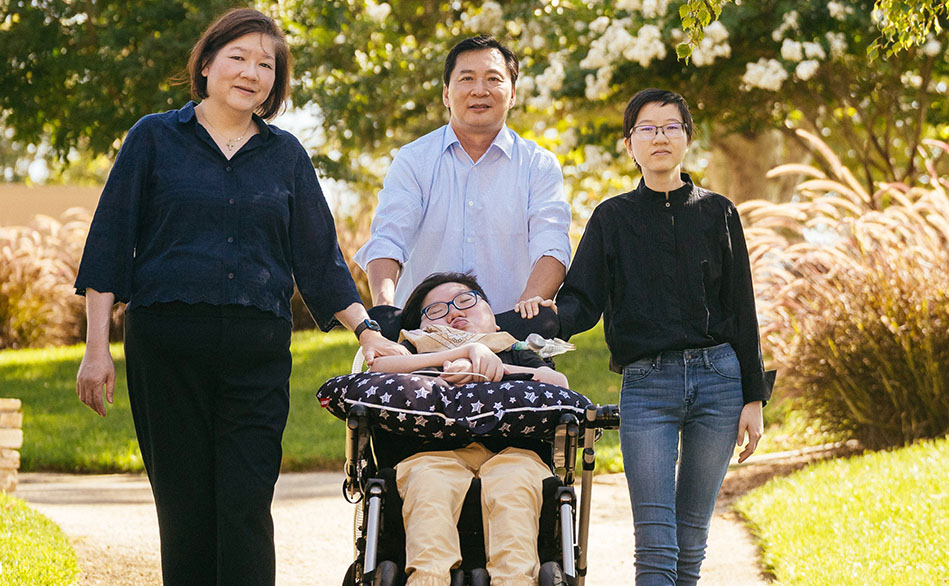Mother of a child with a rare disease unites other families on the same path.
The Yiu family knows all too well the struggles that come with having a child with an undiagnosed disease. When Caroline Cheung-Yiu and Bandy Yiu’s son, Alex, began to progressively lose motor function at age 2 1/2, it was the start of a 10-year medical mystery. Alex continued to lose his ability to walk, stand, speak, eat and breathe on his own. Alex’s parents and his older sister, Elaine, were treating his issues symptom by symptom not knowing if one was related to the other. They went from doctor to doctor and took test after test, but were unable to find an explanation for the sweet, happy-go-lucky boy’s decline.
“I’ve always called him my moving target because we would tackle one thing and then something else would come along,” says Caroline.
The Yius spent years of conducting their own research and reaching out to others with similar symptoms in hopes of gaining a better understanding of Alex’s health. One article in particular proved to be a lifeline. It was the story of a set of twins with symptoms similar to Alex’s, who were diagnosed with an extremely rare condition after undergoing whole genome sequencing. The family also happened to be in San Diego. Caroline reached out the writer, who put her in touch with the family, who in turn referred her to Jennifer Friedman, MD, a neurologist at Rady Children’s Hospital. Dr. Friedman quickly became a source of support and urged them to also undergo genetic testing.
“She opened up a whole new world for me as far as genomic sequencing,” Caroline says.”
Though Alex’s genome sequencing didn’t immediately yield a result, the Yius kept up hope. However, Caroline recalls feeling alone and frustrated with how scattered the available resources were at the time and wanted to share with other families of children with undiagnosed conditions what she’d learned along the way. In 2014, she started at support group called CURE, which stands for Complex, Undiagnosed, Rare and Extraordinary.
“Families with children suffering from an undiagnosed rare disease are overwhelmed with unique challenges,” she says. “I formed CURE as a community where families are understood, and where they can share knowledge and access immediate resources as they discover their path.”
Initially the group focused on undiagnosed conditions but expanded to include families of children with rare diseases as members began getting diagnoses. Then in 2018, the Yius finally got theirs. An Arizona research group inadvertently reanalyzed Alex’s when a staff member looking for a medical record of another patient accidentally transposed two numbers.
“They weren’t looking for Alex’s data, but since they had already pulled it up, they went ahead and ran it through this brand-new software with all the updated genetic studies and reports,” Caroline says.
Alex was diagnosed with NEDAMSS (Neurodevelopmental Disorder with Regression, Abnormal Movements, Loss of Speech and Seizures), a very rare neurodegenerative disorder caused by a mutation in the IRF2BPL gene. It had only been identified months before. They’re now working with clinicians and scientists to find a treatment for Alex, now 18.
Though Caroline says she’s found comfort in connecting with the families of other NEDAMSS patients, she continues to advocate for undiagnosed patients and provide a safe space for families. CURE has been meeting virtually since the start of the pandemic, which turned out to be a blessing in disguise. Caroline can now reach people outside of the San Diego region and bring in a wider variety of guest speakers.
“I am filled with hope knowing that I have made a difference for the undiagnosed and rare local community as we all forge ahead on our quest for diagnosis, treatment, and ultimately a cure,” Caroline says.
To learn more about CURE or register for a virtual meeting, visit cureundx.com
